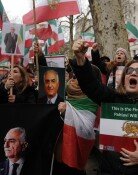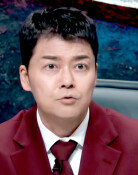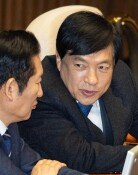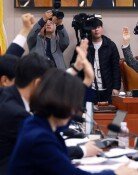North Turns Nuke Treaty Into Scrap
North Turns Nuke Treaty Into Scrap
Posted October. 10, 2006 06:46,
The Joint Declaration of the Denuclearization of the Korean Peninsula has become a scrap of paper.
Not only experts but also both the ruling and opposition lawmakers all agreed in chorus that the joint denuclearization agreement was abrogated by North Koreas nuclear test yesterday.
Some argued that the denuclearization agreement had already been broken by Pyongyangs declaration of having a nuclear arsenal in February last year. However, as it was a mere declaration of possessing nuclear weapons, the situation was much different from now.
South Korea and North Korea signed the Joint Declaration of the Denuclearization of the Korean Peninsula on December 31, 1991. The joint agreement contained following details: a prohibition on the production, emplacement and use of nuclear weapons; use of nuclear energy for peaceful purposes; non-possession of nuclear reprocessing and enrichment facilities; and joint inspections on facilities both parties agreed to.
North Koreas nuclear test certainly violates the clauses that stipulate prohibitions on making a nuclear arsenal and possessing nuclear reprocessing and enrichment facilities.
After signing the denuclearization treaty, the South Korean government withdrew some 750 nuclear arsenals of the ROK-U.S. Combined Forces, one-sidedly. However, North Korea kept developing nuclear weapons and, in the end, breached the joint statement.
Pyongyang even declared withdrawal of its membership from the Nuclear Non-Proliferation Treaty (NPT) in 1993 and the International Atomic Energy Agency (IAEA) in 1994.
North Koreas nuclear crisis appeared to turn a corner in October 1994 when the United States and North Korea signed the Agreed Framework. The communist regime declared to halt its nuclear activities in November 1994 and the Korean Peninsula Energy Development Organization (KEDO) was launched in March 1995 to fulfill the Geneva agreement and provide light-water reactors to the North.
The nuclear problem resurfaced in October 2002 when the U.S. questioned about Pyongyangs development of nuclear weapons through a uranium enrichment program. Pyongyang acknowledged restarting its nuclear facilities in December 2002 and declared secession from the NPT once again in January 2003.
Although six-party talks followed between the two Koreas and neighboring countries to resolve North Koreas nuclear issue, the North announced its possession of two nuclear weapons in February 2005 and eventually has pushed ahead with the nuclear test.
With abrogation of the denuclearization agreement on the Korean Peninsula, some may raise their voices that South Korea should also acquire uranium enrichment and reprocessing technology for peaceful use, though it should not develop or possess nuclear weapons.
However, quite a number of analysts believe such move will trigger a series of negative ripple effects in neighboring countries like the U.S., Japan, and China and its loss will be greater for South Korea than gain. The argument is now drawing much attention to Seouls decision.
mhpark@donga.com leon@donga.com







